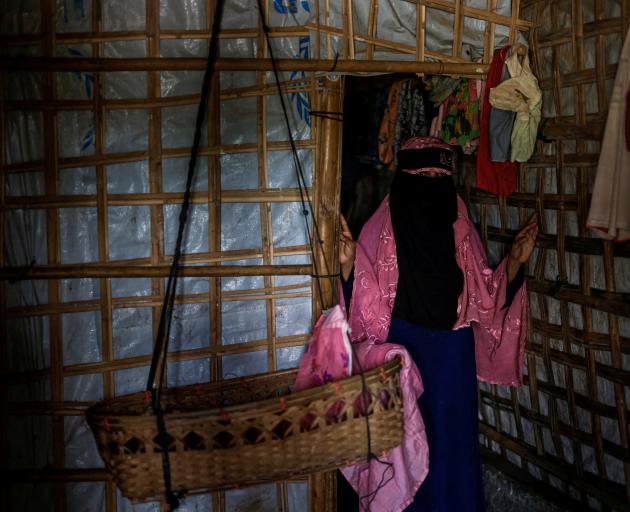Lifestyle
Refugee Children in Bangladesh Face Education Crisis as Schools Close

The closure of schools for Rohingya refugee children in Bangladesh has left over 227,500 students without education, as funding cuts severely impact humanitarian efforts. The suspension of operations at more than 4,500 learning centres, announced by UNICEF in June, has led to a bleak situation for children in the world’s largest refugee settlement, Cox’s Bazar. This crisis coincides with the eighth anniversary of the Rohingya displacement, which began when over 700,000 individuals fled a military crackdown in Myanmar.
Begum, a 35-year-old mother of five, expressed her fears about her daughters’ future. “Without school, girls sit idle. People start talking,” she said, as her youngest child played nearby in their bamboo shelter. Her anxiety stems from the pressure to marry off her 16-year-old daughter, a situation many families face as financial stability erodes in the camps. With approximately 1.2 million Rohingya refugees in Bangladesh, half of whom are children, the need for educational resources has never been more critical.
The United Nations refugee agency, UNHCR, reports a drastic funding shortfall, requiring about $256 million to support the Rohingya this year. Unfortunately, it has only received commitments for around 38% of that amount. Meanwhile, the global humanitarian crisis persists, with the UNHCR expecting only one-third of the $10.6 billion needed to assist displaced people worldwide in 2023.
Juliette Murekeyisoni, interim UNHCR Representative in Bangladesh, highlighted the dire consequences of insufficient funding. “Essential services and lifesaving assistance for the whole Rohingya refugee population are at risk of collapsing,” she stated. Critical services, including food assistance, health care, and education, could be severely disrupted without urgent support.
The implications of this education crisis are profound. With no access to schooling, many children are left to wander the camp, engaging in unproductive activities. “Now the kids just play in the mud or rain. They’re forgetting everything they once learned,” remarked Naser Khan, a Rohingya teacher. The International Rescue Committee (IRC) estimates that about 500,000 children in Cox’s Bazar are missing out on education, with reports of child marriage increasing by 3% and child labour by 7% this year.
In the words of Mohammed Faruq, a father of six who fled Myanmar in 2017, “Only a little bit of education our children could learn was snatched away.” He lamented the loss of his daughters’ educational opportunities, emphasizing the long-term consequences of the crisis. “There is no way back to our homeland anytime soon, and here they have nothing,” he added.
The situation has prompted organizations like UNICEF to reassess their operations. “To stretch every dollar, we have reduced UNICEF staff, streamlined programmes, and cut costs wherever possible,” said Rana Flowers, UNICEF Representative to Bangladesh. Yet, the needs of the Rohingya community far exceed the available resources, resulting in a humanitarian crisis that threatens the future of an entire generation.
As violence in Myanmar continues to drive new arrivals, the pressure on existing services has intensified. Since the onset of the recent influx, nearly 150,000 Rohingya have reached Cox’s Bazar, exacerbating the already strained conditions. “They burned our homes in Myanmar. Here, they are burning our children’s dreams,” reflected Kafayat Ullah, a mathematics teacher who fears for his students’ futures.
The story of 9-year-old Nahima Bibi encapsulates the plight of many children in the camps. “If I don’t go to school, how will I ever become a doctor?” she asked, her voice tinged with sadness. Her aspirations, like those of countless other children, hang in the balance as the educational infrastructure crumbles under the weight of inadequate funding and global priorities.
As international attention shifts, the Rohingya community continues to face overwhelming challenges. Without immediate support, the dreams and futures of these children remain increasingly uncertain, raising urgent questions about the long-term impact of this education crisis.
-

 Sports1 month ago
Sports1 month agoNetball New Zealand Stands Down Dame Noeline Taurua for Series
-

 Entertainment1 month ago
Entertainment1 month agoTributes Pour In for Lachlan Rofe, Reality Star, Dead at 47
-

 Entertainment1 week ago
Entertainment1 week agoNew ‘Maverick’ Chaser Joins Beat the Chasers Season Finale
-

 Sports1 month ago
Sports1 month agoSilver Ferns Legend Laura Langman Criticizes Team’s Attitude
-

 Entertainment2 months ago
Entertainment2 months agoKhloe Kardashian Embraces Innovative Stem Cell Therapy in Mexico
-

 Sports2 months ago
Sports2 months agoGaël Monfils Set to Defend ASB Classic Title in January 2026
-

 World3 months ago
World3 months agoPolice Arrest Multiple Individuals During Funeral for Zain Taikato-Fox
-

 Politics2 weeks ago
Politics2 weeks agoNetball NZ Calls for Respect Amid Dame Taurua’s Standoff
-

 Entertainment3 weeks ago
Entertainment3 weeks agoTyson Fury’s Daughter Venezuela Gets Engaged at Birthday Bash
-

 Sports3 weeks ago
Sports3 weeks agoHeather McMahan Steps Down as Ryder Cup Host After Controversy
-

 Entertainment3 weeks ago
Entertainment3 weeks agoTyson Fury’s Daughter Venezuela Gets Engaged at Birthday Bash
-

 World3 weeks ago
World3 weeks agoNew Zealand Firefighters Plan Strike on October 17 Over Pay Disputes





















